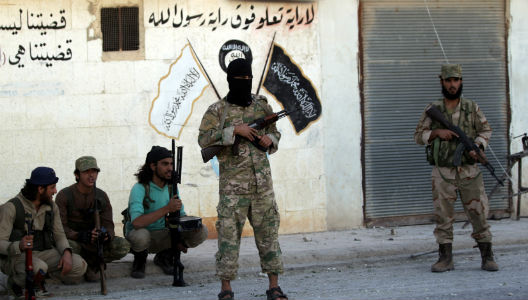 Syrian opposition groups—speaking through the Euphrates Shield operations room and backed by Turkish tanks and warplanes—announced that they had taken control over the Syrian village of Dabiq, 10 kilometers from the Syrian-Turkish border and northeast of Aleppo. Compared to other places in the region, Dabiq has great symbolic value, both historically and religiously. It is mentioned in Islamic prophecies as the apocalyptic battlefield for the “end-of-times battle” between the Muslims and the Romans, as well as in Islamic history in connection to a historic battle that took place between the Ottomans and Mamluks in 1516. This battle opened the door to Ottoman control of the Arab region, which lasted until the end of World War I in 1918.
Syrian opposition groups—speaking through the Euphrates Shield operations room and backed by Turkish tanks and warplanes—announced that they had taken control over the Syrian village of Dabiq, 10 kilometers from the Syrian-Turkish border and northeast of Aleppo. Compared to other places in the region, Dabiq has great symbolic value, both historically and religiously. It is mentioned in Islamic prophecies as the apocalyptic battlefield for the “end-of-times battle” between the Muslims and the Romans, as well as in Islamic history in connection to a historic battle that took place between the Ottomans and Mamluks in 1516. This battle opened the door to Ottoman control of the Arab region, which lasted until the end of World War I in 1918.
Since Abu Bakr al-Baghdadi announced the establishment of the Islamic State in Iraq and Syria (ISIS), Dabiq has attained great importance in ISIS-produced media. The extremist group has used this small village to promote its ideology among both its members and enemies. ISIS’ magazine, Dabiq—whose first issue was published in 2014 in both Arabic and English—is also named after the city. Clearly, the city of Dabiq holds significant symbolism to ISIS that cannot be ignored.
Dabiq’s symbolic value in Islamic history has been an important tool for ISIS, which has used Dabiq to attract foreign fighters and recruit locals, using the village’s significance to drag its enemies into confrontation in the region. In 2014, five foreign hostages were executed by a British member of ISIS, Mohammed al-Emwazi, better known as Jihadi John. John appeared on a video recording with the village of Dabiq behind him and the head of American hostage Abdelrahman Kassig at his feet, saying, “Here we bury the first American crusader in Dabiq, eagerly awaiting the rest of your armies to arrive.”
ISIS has also uploaded video and audio recordings from Dabiq emphasizing its significance. One such recording shows ISIS member Abu Abdullah al-Eritri asserting to the international coalition that the final battle would be held in Dabiq. In another, Abu Musab al-Zarqawi, founder of the Islamic State in Iraq, promotes the idea of the battle for Dabiq using international jihadist discourse, saying, “We struck a spark here in Iraq that will keep going until it burns down the crusader armies in Dabiq.” This statement did not have a significant impact at the time, but the idea resurfaced when it became clear that al-Qaeda’s traditional leadership—represented by Ayman al-Zawahiri—and the local leadership of the Iraq branch of ISIS—represented by Abu Bakr al-Baghdadi—had conflicting aims. Al-Zawahiri decreed that ISIS must withdraw from Syria and leave the task of fighting in this region to al-Nusra Front, a group led by one of al-Baghdadi’s former soldiers—Abu Mohammad al-Julani. ISIS refused because it wanted to ensure it would be able to determine its entry into Syria. This decision had roots in its leaders’ early strategic discourse, specifically, since Abu Musab al-Zarqawi, who seemingly intended to enter Syria one day to reach Dabiq and realize the prophecy of the Prophet, peace be upon him. This might explain why, in most of its videos, ISIS’ al-Furqan Media repeatedly shows the image of a combatant carrying ISIS’ banner—the banner of punishment—and planting it into the ground on a hill believed to be in Dabiq, accompanied by a recording of Abu Musab al-Zarqawi referring to the battle of Dabiq.
Two days before Dabiq was liberated, ISIS tried to downplay the village’s importance. It said its enemies did not know that ISIS’ soldiers could differentiate between a small battle for Dabiq—meaning the battles in which ISIS lost Dabiq—and the great, epic battle for Dabiq, of which the Prophet (peace be upon him) had spoken.
Similarly, an ISIS magazine published statements on its website by Abu Bakr al-Baghdadi, in which he was quoted as saying, “This is not the great battle for Dabiq we are waiting for,” meaning it was not the end-of-times battle.
Observers consider this to be a sign that ISIS is “mentally preparing” its followers to accept leaving Dabiq, which has been foundational in attracting combatants to fight for ISIS. Earlier this month, ISIS indeed left the city.
These are just the latest in a series of written and verbal statements in which ISIS leaders try to downplay their defeats, instead pointing to their ability to go underground and continue fighting their enemies. Yet everyone, including ISIS, knows that its days are numbered. The question now: what comes next?
Feras Hanoush is an activist from Raqqa, a former doctor with Médecins Sans Frontières in Syria, and a member of Raqqa is Being Slaughtered Silently.
Image: Photo: Rebel fighters near Islamic State calligraphy and drawings on a wall in Dabiq town, northern Aleppo countryside, Syria October 16, 2016. REUTERS/Khalil Ashawi
